#fight coronavirus
Text
11 notes
·
View notes
Text
👩🏼⚕️💉👨🏽⚕️
#coronavirus#opening ceremony of the 2012 olimpics#predictive programming#organised crimes#organised scandemic#planned confinements#restrictions#compliance#dirty politics#one world order#you will own nothing#rent everything and be happy#the deep state’s plan to destroy life on eart#enslaving humanity#crimes against humanity#these people are evil#speaktruth#fight for justice#standup#speak up#truth#please share#wwg1wga
13 notes
·
View notes
Text
Daniel Mark Wilkerson - Your Best Health Doctor in Newark, New Jersey
Are you looking for the best health doctor in Newark, New Jersey? Daniel Mark Wilkerson is your best health doctor in New Jersey. Their team of experienced physicians specializes in providing comprehensive health care. Daniel Mark Wilkerson gives the best advice on covid-19 prevention!
3 notes
·
View notes
Text
Protecting the rights of internet users, in Mexico and worldwide
New Post has been published on https://thedigitalinsider.com/protecting-the-rights-of-internet-users-in-mexico-and-worldwide/
Protecting the rights of internet users, in Mexico and worldwide


After the Arab Spring and the Occupy movement, a single Tweet or Facebook post was able to mobilize thousands in a matter of hours. In 2012, protests came to the streets of Mexico as young people demonstrated against the results of the general election.
A recent college graduate of the National Autonomous University of Mexico, Mariel García-Montes had classmates who were nonviolently participating in the protests. One was arrested and jailed, and as García-Montes pored over online surveillance videos and photos to help free her, she was struck by the power of the tools at her disposal.
“Videos and maps and photographs placed her at a different location at the time that her arraignment said,” García-Montes says. “When she was able to walk out of jail partly because of technological evidence, I thought, ‘Maybe this is a window of opportunity to use technology for social good.’”
Over a decade later, García-Montes is still looking for more of those windows. She first came to MIT in 2016 to pursue a master’s degree in comparative media studies and is currently working with Professor Eden Medina on a PhD thesis in the Program in Science, Technology, and Society, which will chart the history of technology’s influence on surveillance and privacy, particularly in her home country.
“I would love for my work, theoretical and practical, to build into these global movements for necessary and proportionate surveillance,” she says. “It needs to have counterweights and limits, and it needs to be really thought through to preserve people’s privacy and other rights, not just security.”
“More broadly,” she continues, “I would love to be part of a generation thinking about what technology would look like if we put the public interest first.”
Growing up alongside the internet
García-Montes has been thinking about justice and the public for much of her life, thanks in large part to her mother, who taught philosophy at the university level.
“She was the ultimate professor for me,” she says. “She provided me with a moral compass and intellectual curiosity, and I’m grateful I get to live her dreams.”
Her mother was also instrumental in piquing her interest in the internet. As a professor, she had access to the internet at a time when few Mexicans did, and set García-Montes up with an email account and allowed her to use the computer at the university when she was a child. The experience was formative, as she noticed the “vast difference” between those who had access and those who did not. For example, she recalls learning online about a devastating tsunami in Asia, while none of her peers had any idea that it was happening.
As time passed and more and more people did gain internet access, the online landscape changed, particularly for young people. García-Montes quickly realized that someone needed to take responsibility for keeping those young people safe and internet-literate, and she worked with a number of organizations that did just that, such as UNICEF and Global Changemakers. The issues have only compounded since then, but she isn’t letting up either.
“There’s no silver bullet,” she says. “We need to rethink the entire ecosystem. We cannot put it on parents to teach their kids. We cannot put it on teachers. We cannot put it on online users. Instead of only centering profit and only centering page views or engagement, we need to also center pro-social behavior and the public interest.”
Raised by women — her mom, her aunt, her cousin, and her grandmother — García-Montes incorporates the feminist ideals of her upbringing into her academic work wherever she can. In 2022, she helped write a paper with MIT associate professor of urban science and planning Catherine D’Ignazio that examined the ways activists around the world are trying to address the deficiencies in government data on gender-related violence against women. The data are often absent or incomplete, so she and her co-authors highlighted the vital work being done to fill in the gaps.
“When Catherine started to work with feminicide data activists, I knew a bunch of them because I had worked with them previously,” she says. “I thought, ‘Oh, my goodness, the day has finally come that these people can have the prominence that they’ve long deserved.’ The hours of work that they put in and the emotional toll it takes on them is just outstanding, and they weren’t really getting the recognition for that labor and their technical expertise.”
Her dissertation is a study of the history of surveillance technologies in Mexico. Specifically, she is looking at the ways contemporary debates on information technologies, such as spyware and facial recognition, interact with existing governance and infrastructures.
The future of privacy and community
Her thesis research has instilled in García-Montes a deep concern for where things are headed for the average citizen.
“Different types of data collection continue to be developed because of the data broker industry,” she says. “Your power bill can be an instrument of surveillance, and facial recognition has been appearing in airports. The forms of data collection are becoming much more nuanced, much more pervasive, and much harder to evade.”
This pervasiveness has led to a general acceptance among the population, she says, but she’s also encouraged by the advocacy groups that have continued to fight on. She agrees with those groups that it should not be left to individuals to protect their own data, and that ultimately, there needs to be a legislative and cultural environment that values the preservation of privacy.
“The awareness of fights that have been won is rising,” she says. “The awareness of the loss of privacy is also rising, and so I don’t think that it’s going to be a clear win for privacy-violating companies.”
While her studies at MIT fill most of her time, García-Montes also finds purpose participating in community life in her Greater-Boston neighborhood. During the coronavirus pandemic, García-Montes and her neighbors forged bonds as they provided mutual aid for the essential workers and vulnerable people of their neighborhood. The camaraderie they developed persists today.
Whether online or in real life, “There is joy in community,” she says. “At the root of it, I want to be around people. I want to know my neighbors, and being able to use technology to solve some of our mutual aid needs helps me feel good.”
#2022#Arab Spring#Asia#autonomous#awareness#Behavior#centering#chart#college#Community#Companies#Comparative Media Studies/Writing#compass#computer#coronavirus#curiosity#data#data collection#election#email#Environment#Facebook#facial recognition#Fight#Forms#Future#Gender#general election#Global#governance
0 notes
Text
Dealing with Anxiety, a Pandemic and Quarantine
A pandemic is enough to stress out anyone. Throw in a possible quarantine and a lot of unknowns, and it’s easy to fall into the anxiety spiral. Here in Jacksonville we aren’t on total lockdown yet, but you can feel it coming. Every morning I check the news and see it creeping closer and closer to us. And now that they’ve taken the beaches away here, it’s leaving me wishing they’d just do it and…

View On WordPress
#anxiety#coping#coronavirus#covid-19#fighting anxiety#Mental Health#Mom Life#quarantine#stress#virus anxiety
1 note
·
View note
Text
"University of Houston researchers make nasal vaccine that prevents COVID from spreading"
For reasons I don't understand, I'm having trouble linking directly to this Houston Chronicle post. But here's most of the text. (The URL's at the bottom if you want to try it.)
A team of researchers from the University of Houston have developed a new vaccine to treat and prevent the spread of flu and multiple coronavirus strains.
Through two nasal sprays — an immune activating therapeutic treatment and a new vaccine — the team of UH researchers have not only broken ground on vaccinating against SARS-CoV-2 and the flu virus, but also on creating a universal coronavirus vaccine.
Dr. Navin Varadarajan, who leads the lab behind the nasal sprays, said the new vaccine will be a game-changer to the “major obstacle” of current vaccines, which can prevent people from serious illness, but not stop them from spreading the disease to others.
“They can (current vaccines) keep you out of the hospital, but it doesn’t stop you from spreading it to vulnerable people,” Varadarajan said.
On top of providing a way to stop the spread of COVID to those most at risk — the elderly and immunocompromised — the new nasal vaccine is a crucial step forward in the goal of fighting viral evolution.
It’s natural for viruses to change and evolve — and SARS-CoV-2, the virus that causes COVID-19, is no exception. As viruses spread farther and faster, they can better adapt to their environment. Successful variants beat out weaker ones, which can lead to easier transmission or worsened disease.
While many viral variants have minimal impact, over time viruses become stronger against existing vaccines. SARS-CoV-2 resides in the nose, and since existing vaccines are intramuscular, meaning they are administered through a shot in the arm, the virus is not actually eliminated from the body.
NanoSTING-SN, on the other hand, hits “the last mile” of the nose, which prevents the disease from spreading, Varadarajan said. It’s also a pan-coronavirus nasal vaccine, meaning it works against the infection and disease of all viruses in the coronavirus family.
In animals, the nasal vaccine was 100% effective in stopping transmission of the Omnicron variants of concern to unvaccinated hosts.
Despite the wide-use of Pfizer and Moderna, viral evolution of the disease forces scientists to keep updating existing vaccines.
To Varadarajan, the nasal vaccine can also stop the cyclical need to create more COVID boosters — a method he not only says doesn’t get to the heart of the problem, but also anticipates the general public will be less willing to sign on board for.
The article URL:
https://www.houstonchronicle.com/news/houston-texas/health/article/university-of-houston-covid-nasal-vaccine-19628489.php
4K notes
·
View notes
Text
PM Modi chaired a high-level meeting as COVID-19 cases continue to spike
Covid and Influenza cases are increasing in the country at a rapid rate. On Wednesday, PM Modi chaired a high-level meeting to discuss the spike in the cases.
During the meeting, the prime minister urged healthcare providers and governments to maintain a strict vigil against covid-19. He also asserted the importance of genome sequencing at this time and said that it should be done more. Addressing to the meeting members, Modi also said that the Covid situation is ‘far from over.’
The Union Health Ministry on Wednesday stated that India recorded 1,134 new Covid cases, while the active cases increased to 7,026. The situation is continually getting worse.
The meeting was held to brief the Prime Minister about the rising Covid cases in the country and to update that the average daily cases are 888 and weekly positivity was reported as 0.98 percent in the week ending March 22.
Chhattisgarh, Delhi, Gujarat, Maharashtra, and Kerala have registered one death each which increased the total number of deaths due to Covid to 5,30,813.
Maharashtra remains at the top of the Covid-19 spread as the state recorded 334 fresh coronavirus cases on Wednesday. The total number of COVID-infected people in Maharashtra has now reached 1648 with one fatality recorded.
The Prime Minister asked people to follow Coronavirus safety protocol and maintain respiratory hygiene. He urged them to follow appropriate behavior in crowded places.
For more national and political news India in Hindi, subscribe to our newsletter.
#werindia#leading india news source#corona news#coronavirus variants#india fights corona#coronavirus#top news today#top news headlines#top news of the day
0 notes
Text
Greek PM calls on all to stay the course in fight against coronavirus
ATHENS, April 2 (Reuters) – Greek Prime Minister Kyriakos Mitsotakis on Thursday urged Greeks to continue to comply with lockdown measures and stay home to stem the spread of the coronavirus and avoid the tragedy seen in other countries.
“April will be the most critical month, if we relax we will pay for it and we must not let this happen,” he told the country’s parliament.
Greece, which recorded…
View On WordPress
0 notes
Photo
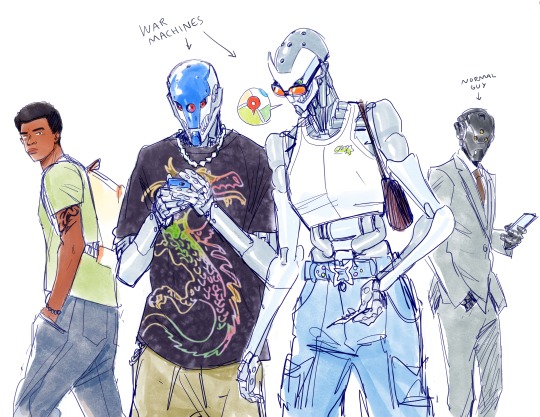
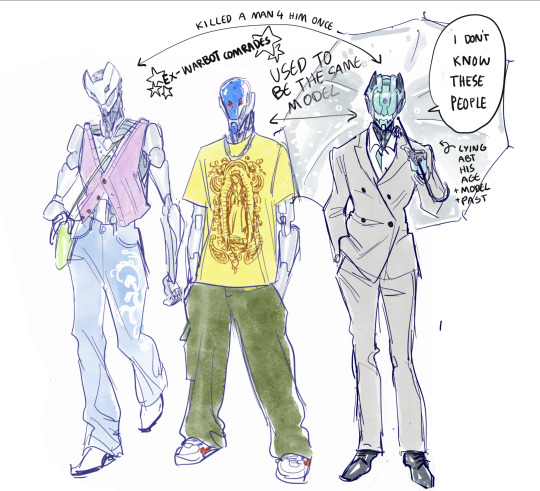


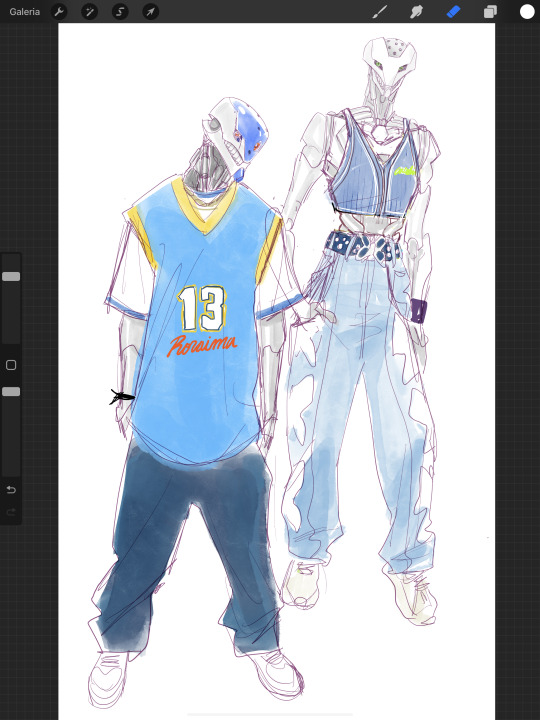


Ex-warbot OC
They don’t have names yet.
The two bots with the scary faces were specifically made for war, and now that it’s over, they still maintained their original ‘warface’ even though it has stigma associated to it. Many robots changed their faceplates post-war, as it made it easier to find jobs and not get into unnecessary conflict.
The sleeker looking guy used to be in their company, though he wasn’t made in the same factory as them; he isn’t their ’batch-mate’.
After the war he completely modified his frame, and now has an idol career. He desperately wats to erase his past, as people (and robots alike) will respond better to a ‘new’ and untainted idol.
The two warface bots are “brother and sister” and they do odd jobs here and there to make ends meet and to be able to afford things they want. Rich people hire them as bouncers a lot since they are a symbol of terrible times. Sometimes they earn 15k in one night for just one gig it’s crazy. They both really love clothes since it distances them from their body’s original purpose while simultaneously not erasing their past. Also they look cute and cool!
The idol bot once meets the warfaces by chance in the street and pretends he doesn’t know them AGAHAKALAK I think he’s insane… completely erasing your past and the person you were is psychopathic to me idk. Anyway
There arent a lot of warfaces going around anymore. since they either died during the war or changed their frames. Pre-war bots were re-fitted during the conflicts and just had to go back to their former unweaponized frames after it was all over so they’re fine.
All of these robots can download information and i want that type of learning to mostly disappear if its deleted, but if they learn things like we do or experience real events, those memories and skills can’t really truly be erased; if they do try erasing them, they will still remember them, just not with HD video clarity, which brings them immense suffering sometimes. “How to people live like this?!” Well buddy it sucks idk we all cope
Newly minted robots are wack because they don’t exactly have a ‘soul’ yet they just do things they’re supposed to do, but after some time, all of them actually develop real awareness and shit… my war bots had like a 78% chance of dying everyday when they were activated, but they survived and attained sentience at like one year post birth and they wised up rly fast after that. They remember their first year, but they describe it as a ‘weird haze’
These robots feel pain so they wont like dive into a hole or damage themselves too much. Self preservation means longer-lived machines which means less repair costs and less human lives on the line as well.. slay !!!
While the conflicts went on, most robots achieved sentience and decided to stop fighting so there was like a robots rights movement and eventually the war stopped altogether and now the robots have a salary and a normal life mostly.
They arent organics, so they need other things. They are solar powered and need oil sometimes and also they need new nanomachines once in a while like we need vaccines. Get your boosters… its not just tetanus and coronavirus anymore now they gotta think about like..the trojan horse 9000
I want them to have this aversion to organic things dying bc they are universally gross. Like they dont like seeing living-machines die either but a rat being squished by a car is also gross!
There are probably some tensions between humans and robots but like i kinda get it bc i wouldnt mess with a guy who has like lead pipes for arms. also most robots ARE normal but some are insane idk 🙆♀️🤷♀️ just like people are.
mine are normal tho they’re just vibing 💖🗣🤙
1K notes
·
View notes
Text
For Sander van der Linden, misinformation is personal.
As a child in the Netherlands, the University of Cambridge social psychologist discovered that almost all of his mother’s family had been executed by the Nazis during the Second World War. He became absorbed by the question of how so many people came to support the ideas of someone like Adolf Hitler, and how they might be taught to resist such influence.
While studying psychology at graduate school in the mid-2010s, van der Linden came across the work of American researcher William McGuire. In the 1960s, stories of brainwashed prisoners-of-war during the Korean War had captured the zeitgeist, and McGuire developed a theory of how such indoctrination might be prevented. He wondered whether exposing soldiers to a weaker form of propaganda might have equipped them to fight off a full attack once they’d been captured. In the same way that army drills prepared them for combat, a pre-exposure to an attack on their beliefs could have prepared them against mind control. It would work, McGuire argued, as a cognitive immunizing agent against propaganda—a vaccine against brainwashing.
Traditional vaccines protect us by feeding us a weaker dose of pathogen, enabling our bodies’ immune defenses to take note of its appearance so we’re better equipped to fight the real thing when we encounter it. A psychological vaccine works much the same way: Give the brain a weakened hit of a misinformation-shaped virus, and the next time it encounters it in fully-fledged form, its “mental antibodies” remember it and can launch a defense.
Van der Linden wanted to build on McGuire’s theories and test the idea of psychological inoculation in the real world. His first study looked at how to combat climate change misinformation. At the time, a bogus petition was circulating on Facebook claiming there wasn’t enough scientific evidence to conclude that global warming was human-made, and boasting the signatures of 30,000 American scientists (on closer inspection, fake signatories included Geri Halliwell and the cast of M*A*S*H).
Van der Linden and his team took a group of participants and warned them that there were politically motivated actors trying to deceive them—the phony petition in this case. Then they gave them a detailed takedown of the claims of the petition; they pointed out, for example, Geri Halliwell’s appearance on the list. When the participants were later exposed to the petition, van der Linden and his group found that people knew not to believe it.
The approach hinges on the idea that by the time we’ve been exposed to misinformation, it’s too late for debunking and fact-checking to have any meaningful effect, so you have to prepare people in advance—what van der Linden calls “prebunking.” An ounce of prevention is worth a pound of cure.
When he published the findings in 2016, van der Linden hadn’t anticipated that his work would be landing in the era of Donald Trump’s election, fake news, and post-truth; attention on his research from the media and governments exploded. Everyone wanted to know, how do you scale this up?
Van der Linden worked with game developers to create an online choose-your-own-adventure game called Bad News, where players can try their hand at writing and spreading misinformation. Much like a broadly protective vaccine, if you show people the tactics used to spread fake news, it fortifies their inbuilt bullshit detectors.
But social media companies were still hesitant to get on board; correcting misinformation and being the arbiters of truth is not part of their core business model. Then people in China started getting sick with a mysterious flulike illness.
The coronavirus pandemic propelled the threat of misinformation to dizzying new heights. Van der Linden began working with the British government and bodies like the World Health Organization and the United Nations to create a more streamlined version of the game specifically revolving around Covid, which they called GoViral! They created more versions, including one for the 2020 US presidential election, and another to prevent extremist recruitment in the Middle East. Slowly, Silicon Valley came around.
A collaboration with Google has resulted in a campaign on YouTube in which the platform plays clips in the ad section before the video starts, warning viewers about misinformation tropes like scapegoating and false dichotomies and drawing examples from Family Guy and Star Wars. A study with 20,000 participants found that people who viewed the ads were better able to spot manipulation tactics; the feature is now being rolled out to hundreds of millions of people in Europe.
Van der Linden understands that working with social media companies, who have historically been reluctant to censor disinformation, is a double-edged sword. But, at the same time, they’re the de facto guardians of the online flow of information, he says, “and so if we’re going to scale the solution, we need their cooperation.” (A downside is that they often work in unpredictable ways. Elon Musk fired the entire team who was working on pre-bunking at Twitter when he became CEO, for instance.)
This year, van der Linden wrote a book on his research, titled Foolproof: Why We Fall for Misinformation and How to Build Immunity. Ultimately, he hopes this isn’t a tool that stays under the thumb of third-party companies; his dream is for people to inoculate one another. It could go like this: You see a false narrative gaining traction on social media, you then warn your parents or your neighbor about it, and they’ll be pre-bunked when they encounter it. “This should be a tool that’s for the people, by the people,” van der Linden says.
441 notes
·
View notes
Text
{ MASTERPOST } Everything You Need to Know about Repairing Our Busted-Ass World
On poverty:
Starting from nothing
How To Start at Rock Bottom: Welfare Programs and the Social Safety Net
How to Save for Retirement When You Make Less Than $30,000 a Year
Ask the Bitches: “Is It Too Late to Get My Financial Shit Together?“
Understanding why people are poor
It’s More Expensive to Be Poor Than to Be Rich
Why Are Poor People Poor and Rich People Rich?
On Financial Discipline, Generational Poverty, and Marshmallows
Bitchtastic Book Review: Hand to Mouth by Linda Tirado
Is Gentrification Just Artisanal, Small-Batch Displacement of the Poor?
Coronavirus Reveals America’s Pre-existing Conditions, Part 1: Healthcare, Housing, and Labor Rights
Developing compassion for poor people
The Latte Factor, Poor Shaming, and Economic Compassion
Ask the Bitches: “How Do I Stop Myself from Judging Homeless People?“
The Subjectivity of Wealth, Or: Don’t Tell Me What’s Expensive
A Little Princess: Intersectional Feminist Masterpiece?
If You Can’t Afford to Tip 20%, You Can’t Afford to Dine Out
Correcting income inequality
1 Easy Way All Allies Can Help Close the Gender and Racial Pay Gap
One Reason Women Make Less Money? They’re Afraid of Being Raped and Killed.
Raising the Minimum Wage Would Make All Our Lives Better
Are Unions Good or Bad?
On intersectional social issues:
Reproductive rights
On Pulling Weeds and Fighting Back: How (and Why) to Protect Abortion Rights
How To Get an Abortion
Blood Money: Menstrual Products for Surviving Your Period While Poor
You Don’t Have to Have Kids
Gender equality
1 Easy Way All Allies Can Help Close the Gender and Racial Pay Gap
The Pink Tax, Or: How I Learned to Love Smelling Like “Bearglove”
Our Single Best Piece of Advice for Women (and Men) on International Women’s Day
Bitchtastic Book Review: The Feminist Financial Handbook by Brynne Conroy
Sexual Harassment: How to Identify and Fight It in the Workplace
Queer issues
Queer Finance 101: Ten Ways That Sexual and Gender Identity Affect Finances
Leaving Home before 18: A Practical Guide for Cast-Offs, Runaways, and Everybody in Between
Racial justice
The Financial Advantages of Being White
Woke at Work: How to Inject Your Values into Your Boring, Lame-Ass Job
The New Jim Crow, by Michelle Alexander: A Bitchtastic Book Review
Something Is Wrong in Personal Finance. Here’s How To Make It More Inclusive.
The Biggest Threat to Black Wealth Is White Terrorism
Coronavirus Reveals America’s Pre-existing Conditions, Part 2: Racial and Gender Inequality
10 Rad Black Money Experts to Follow Right the Hell Now
Youth issues
What We Talk About When We Talk About Student Loans
The Ugly Truth About Unpaid Internships
Ask the Bitches: “I Just Turned 18 and My Parents Are Kicking Me Out. How Do I Brace Myself?”
Identifying and combatting abuse
When Money is the Weapon: Understanding Intimate Partner Financial Abuse
Are You Working on the Next Fyre Festival?: Identifying a Toxic Workplace
Ask the Bitches: “How Do I Say ‘No’ When a Loved One Asks for Money… Again?”
Ask the Bitches: I Was Guilted Into Caring for a Sick, Abusive Parent. Now What?
On mental health:
Understanding mental health issues
How Mental Health Affects Your Finances
Stop Recommending Therapy Like It’s a Magic Bean That’ll Grow Me a Beanstalk to Neurotypicaltown
Bitchtastic Book Review: Kurt Vonnegut’s Galapagos and Your Big Brain
Ask the Bitches: “How Do I Protect My Own Mental Health While Still Helping Others?”
Coping with mental health issues
{ MASTERPOST } Everything You Need to Know about Self-Care
My 25 Secrets to Successfully Working from Home with ADHD
Our Master List of 100% Free Mental Health Self-Care Tactics
On saving the planet:
Changing the system
Don’t Boo, Vote: If You Don’t Vote, No One Can Hear You Scream
Ethical Consumption: How to Pollute the Planet and Exploit Labor Slightly Less
The Anti-Consumerist Gift Guide: I Have No Gift to Bring, Pa Rum Pa Pum Pum
Season 1, Episode 4: “Capitalism Is Working for Me. So How Could I Hate It?”
Coronavirus Reveals America’s Pre-existing Conditions, Part 1: Healthcare, Housing, and Labor Rights
Coronavirus Reveals America’s Pre-existing Conditions, Part 2: Racial and Gender Inequality
Shopping smarter
You Deserve Cheap Toilet Paper, You Beautiful Fucking Moon Goddess
You Are above Bottled Water, You Elegant Land Mermaid
Fast Fashion: Why It’s Fucking up the World and How To Avoid It
You Deserve Cheap, Fake Jewelry… Just Like Coco Chanel
6 Proven Tactics for Avoiding Emotional Impulse Spending
Join the Bitches on Patreon
#poverty#economics#income inequality#wealth inequality#capitalism#working class#labor rights#workers rights#frugal#personal finance#financial literacy#consumerism#environmentalism
156 notes
·
View notes
Text
💥💥💥
#coronavirus#patented#viruses#bioweapon#crimes against humanity#nih#biological warfare#health#Anthony FOUCI#depopulation agenda#gain of function#patriots#freedom fighters#truthers#digital soldiers#soldiers#these people are evil#standup#fight for justice#scam artists#corruption#please share#speak up#truth#wwg1wga#MAGA
7 notes
·
View notes
Text
"“It’s not your fault,” I told 16-year-old Cara, whose mother died of a SARS-CoV-2 infection [Cara] gave her. To be clear, the doctor confirmed Cara (not her real name) had passed on the virus and Covid was entered on the death certificate as the cause of death.
Cara’s mother had not been outside their home in the weeks preceding her death.
When masks were dropped in the “Omicron’s mild” phase of the pandemic, Cara continued as the lone masker at school to protect her immunocompromised mother, who was undergoing chemotherapy. It was tolerable until a child psychotherapist said on the national airwaves that some girls would continue to mask anyway “to hide their acne”.
His words were used to bully her. Cara left, but without support from teachers she struggled. Her parents pleaded with the school to use the Hepa filter they bought. The school refused.
Cara eventually returned to school unmasked, caught Covid and infected her mam. It killed her. Cara self-harms because she blames herself. She hasn’t been to school since.
Research shows that more than 70pc of Sars-CoV-2 transmission in households started with a child.
The incidence was highest during unmitigated in-person schooling. In a recent paper, Dr Pantea Javidan, of Stanford’s Centre for Human Rights, described the ways children’s rights to life, health and safety during the ongoing pandemic have been falsely rendered oppositional to education and development.
Methods used to manufacture consent to forcibly, repeatedly infect children, according to Dr Javidan, include minimising harms to children (“kids don’t get it or spread it”, “it’s mild”) and moral panic around mental health and educational attainment.
Regarding mental health, in August a study looking at paediatric psychiatric emergencies found school openings – not lockdowns – were associated with an increase in the number of emergency psychiatric visits.
In May, a study found that children with and without congenital heart defects showed increased risks for a variety of cardiovascular outcomes (including cardiac arrest, clots, palpitations) after Sars-CoV-2 infection.
In July, a study found that children and teenagers experienced cognitive impairment 12 months post-Covid infection, consistently correlated with poorer sleep and behavioural and emotional functioning.
Last month alone, several studies were published documenting Covid paediatric harms.
One found that children and adolescents experience prolonged symptoms post-Sars-CoV-2 infection in almost every organ system.
Study co-author Professor Lawrence C Kleinman said: “We have convincing evidence that Covid is not just a mild, benign illness for children. This is a new chronic illness in children. We need to be prepared to deal with it for a generation.”
Another study analysing paediatric and adult hospitalisations found teenagers were at greatest risk of severe disease among all children. Yet another study showed compelling connections between viral infection and subsequent autoimmune disease. Early in the pandemic, some children showed negligible Covid symptoms, only to later develop organ failure.
Researchers found the children’s immune systems had latched on to a part of the coronavirus that closely resembles a protein found in the heart, lungs, kidneys, brain, skin, eyes and GI tract and launched a catastrophic attack on their own tissues. “Experts” who claimed asymptomatic paediatric Sars2 infections equals mild were catastrophically wrong.
Covid is consistently a leading cause of US child mortality. Paediatric mortality has increased markedly with each year of the pandemic in the US, UK and elsewhere. In 2022, over six times as many children died from Covid than from flu in the US."
88 notes
·
View notes
Text
Highly Skilled and Experienced Doctor - Daniel Mark Wilkerson
Dr. Daniel Mark Wilkerson is a highly skilled and experienced doctor who is always looking for new ways to improve his treatment methods. Daniel Mark Wilkerson has given easy steps for the prevention of corona virus, with the help of which the corona virus can be stopped from spreading and its infection itself can be avoided.
#Daniel Mark Wilkerson#Slideshare#Help In the Fight against (Coronavirus)#F6s#issuu#Wordpress#Behance#Deadline#Hollywood News
1 note
·
View note
Text
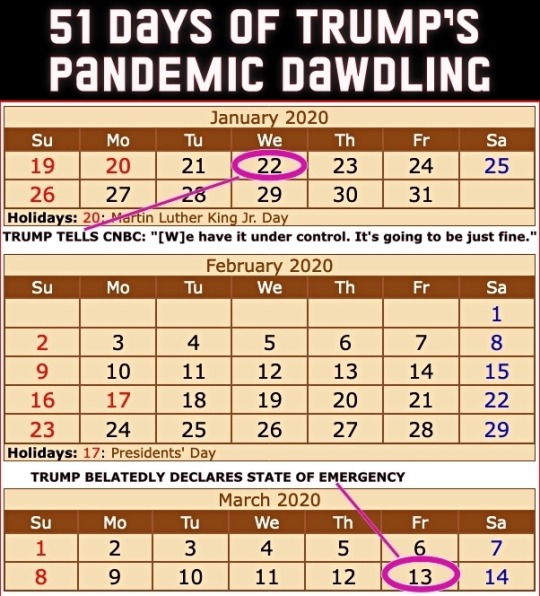
Four years ago today (March 13th), then President Donald Trump got around to declaring a national state of emergency for the COVID-19 pandemic. The administration had been downplaying the danger to the United States for 51 days since the first US infection was confirmed on January 22nd.
From an ABC News article dated 25 February 2020...
CDC warns Americans of 'significant disruption' from coronavirus
Until now, health officials said they'd hoped to prevent community spread in the United States. But following community transmissions in Italy, Iran and South Korea, health officials believe the virus may not be able to be contained at the border and that Americans should prepare for a "significant disruption."
This comes in contrast to statements from the Trump administration. Acting Department of Homeland Security Secretary Chad Wolf said Tuesday the threat to the United States from coronavirus "remains low," despite the White House seeking $1.25 billion in emergency funding to combat the virus. Larry Kudlow, director of the National Economic Council, told CNBC’s Kelly Evans on “The Exchange” Tuesday evening, "We have contained the virus very well here in the U.S."
[ ... ]
House Speaker Nancy Pelosi called the request "long overdue and completely inadequate to the scale of this emergency." She also accused President Trump of leaving "critical positions in charge of managing pandemics at the National Security Council and the Department of Homeland Security vacant."
"The president's most recent budget called for slashing funding for the Centers for Disease Control, which is on the front lines of this emergency. And now, he is compounding our vulnerabilities by seeking to ransack funds still needed to keep Ebola in check," Pelosi said in a statement Tuesday morning. "Our state and local governments need serious funding to be ready to respond effectively to any outbreak in the United States. The president should not be raiding money that Congress has appropriated for other life-or-death public health priorities."
She added that lawmakers in the House of Representatives "will swiftly advance a strong, strategic funding package that fully addresses the scale and seriousness of this public health crisis."
Senate Minority Leader Chuck Schumer also called the Trump administration's request "too little too late."
"That President Trump is trying to steal funds dedicated to fight Ebola -- which is still considered an epidemic in the Democratic Republic of the Congo -- is indicative of his towering incompetence and further proof that he and his administration aren't taking the coronavirus crisis as seriously as they need to be," Schumer said in a statement.
A reminder that Trump had been leaving many positions vacant – part of a Republican strategy to undermine the federal government.
Here's a picture from that ABC piece from a nearly empty restaurant in San Francisco's Chinatown. The screen displays a Trump tweet still downplaying COVID-19 with him seeming more concerned about the effect of the Dow Jones on his re-election bid.
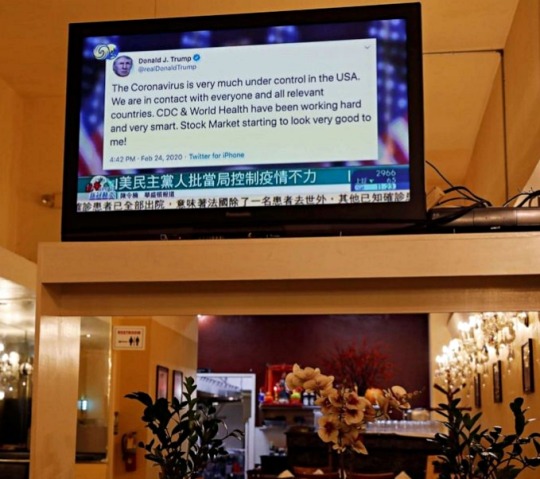
People were not buying Trump's claims but they were buying PPE.
I took this picture at CVS on February 26th that year.
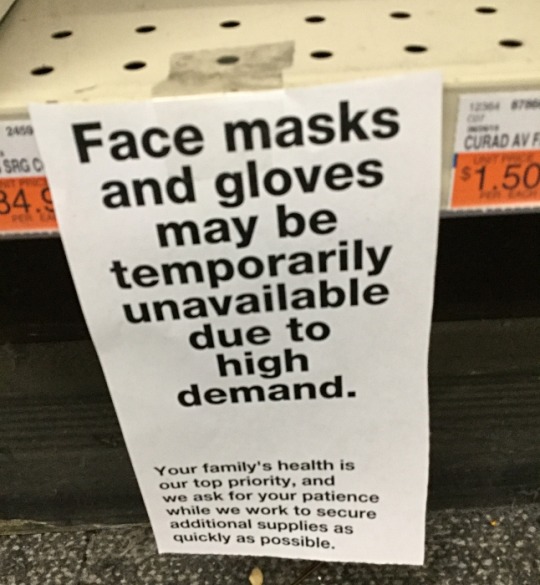
The stock market which Trump in his February tweet claimed looked "very good" was tanking on March 12th – the day before his state of emergency declaration.
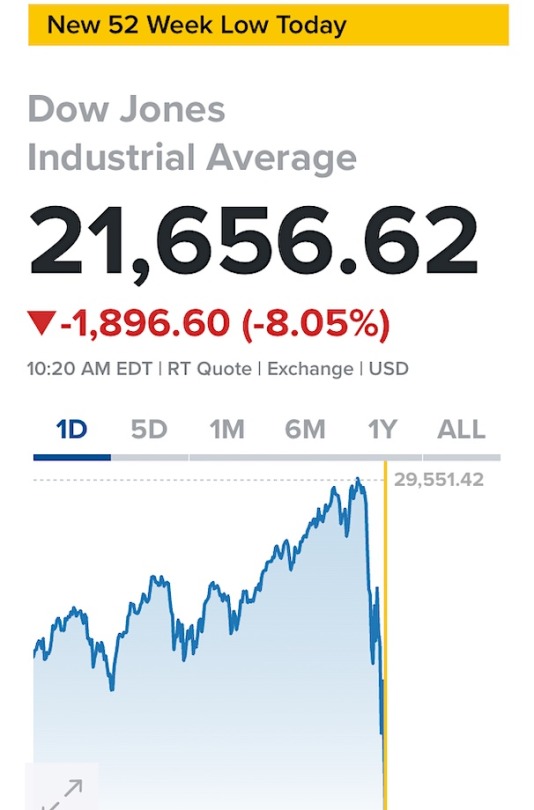
Trump succeeded in sending the US economy into recession much faster than George W. Bush did at the end of his term – quite a feat!. (As an aside, every recession in the US since 1981 has been triggered by Republican presidents.)
Of course Trump never stopped trying to downplay the pandemic nor did he ever take responsibility for it. The US ended up with the highest per capita death rate of any technologically advanced country.
Precious time was lost while Trump dawdled. Orange on this map indicates COVID infections while red indicates COVID deaths. At the time Trump declared a state of emergency, the virus had already spread to 49 states.

The United States could have done far better and it certainly had the tools to do so.
The Obama administration had limited the number of US cases of Ebola to under one dozen during that pandemic in the 2010s. Based on their success, they compiled a guide on how the federal government could limit future pandemics.
Obama team left pandemic playbook for Trump administration, officials confirm
Of course Trump ignored it.
Unlike those boxes of nuclear secrets in Trump's bathroom, the Obama pandemic limitation document is not classified. Anybody can read it – even if Trump didn't. This copy comes from the Stanford University Libraries.
TOWARDS EPIDEMIC PREDICTION: FEDERAL EFFORTS AND OPPORTUNITIES IN OUTBREAK MODELING
Feel free to share this post with anybody who still feels nostalgic about the Trump White House years!
#covid-19#coronavirus#pandemic#public health#donald trump#trump's incompetent response to the pandemic#covid state of emergency#2020#trump recession#51 days of trump pandemic dawdling#obama pandemic playbook#2010s ebola outbreak#nostalgia for trump administration#republicans#election 2024#vote blue no matter who
114 notes
·
View notes
Text
The South Jersey business owner who defied Gov. Phil Murphy’s COVID lockdown orders by keeping his gym open, racking up dozens of court summonses, has been cleared of all charges, his attorney said Tuesday.
Ian Smith, co-owner of Atilis Gym in Bellmawr, opened his facility during the coronavirus pandemic in May 2020 in defiance of a state-ordered closing of nonessential businesses. Police arrested some gym members as they left after workouts at the facility.
Smith and co-owner Frank Trumbetti were fined more than $165,000 and faced more than 80 summonses charging them with violating a governor’s orders, operating without a mercantile license, creating a public nuisance and disturbing the peace.
At one point, the state Attorney General’s office recommended fines of up to $10,000 a day and imprisonment for the owners of Atilis if they did not shutter their business. Many of the charges also carried up to six months in jail, said Smith’s attorney, John McCann of Oakland in Bergen County.
“When you look at this, it didn’t make a lot of sense at the time. It kind of looked like they were throwing everything they could at these guys,” McCann said.
McCann said the summonses were written up by the Bellmawr Police Department, but the cases were later transferred to Winslow Township Municipal Court due to a conflict.
“Those charges hung over these guys’ heads for over four years,” McCann said.
On April 24, a judge in Winslow Township dismissed the charges but gave the prosecutors until this week to appeal.
“We didn’t get a lot of cooperation from Bellmawr with regard to discovery. The only thing we got with regard to discovery was the summonses,” McCann said Tuesday.
“You need the reports, you need a whole bunch of stuff. The judge in Winslow said Bellmawr didn’t provide their court with meaningful discovery to give to us,” McCann said. “She basically said that Bellmawr ignored the requests.”
When there was no appeal from officials in Bellmawr or the state, all charges were dropped with prejudice, meaning they cannot be filed again, according to McCann.
Bellmawr’s court clerk on Tuesday declined to comment on the case, and the court clerk in Winslow Township was not immediately available to comment.
A spokesperson for the state Attorney General’s Office did not immediately respond to a call and an email seeking comment Tuesday morning.
In an interview during the pandemic, Smith accused the state of being “very selective” about which businesses could stay open and those that could not.
“Telling people that liquor stores are essential but places they can come to work on their physical and mental health is not — it’s just not adding up. So, we decided to take matters into our own hands,” Smith said at the time.
In May 2020, the business filed a federal lawsuit against the state, accusing Murphy, along with then-Attorney General Gurbir Grewal and other New Jersey officials of violating the owners’ constitutional rights by forcing them out of business indefinitely with no timeline for when they can reopen.
McCann on Tuesday said Atilis’ owners did not make money off gym memberships during the pandemic. The facility, for that period of time, became the campaign headquarters for Republican U.S Senate candidate Rik Mehta, who challenged Democrat Cory Booker for his U.S. Senate seat.
People entering Atilis were exercising their right to volunteer for Mehta’s candidacy. If they worked out while they were there, they were not charged a membership fee, McCann said.
“There was no income coming in but for the GoFundMe money they were raising to fight the state,” McCann said. The GoFundMe raised more than $530,000 for the gym owners’ cause.
On Sunday, Smith took to social media to claim victory in the gym’s fight against the state.
“The support we received locally, nationally, and internationally for our stand is something I will be forever grateful for,” Smith said.
74 notes
·
View notes